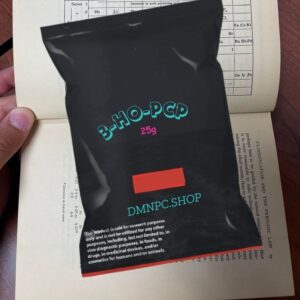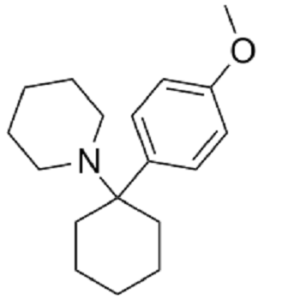3-MeO-PCP (3-Methoxyphencyclidine) is a synthetic chemical compound that belongs to the arylcyclohexylamine class of substances. It is a dissociative anesthetic, structurally related to phencyclidine (PCP) and other dissociatives like ketamine and 3-MeO-PCE.
Key Characteristics of 3-MeO-PCP:
- Chemical Structure:
- The full chemical name is 3-Methoxy-1-(1-phenylcyclohexyl)piperidine.
- It is a derivative of PCP, with a methoxy (-OCH₃) group attached to the third position of the phenyl ring. This modification alters its pharmacological properties compared to PCP.
- Mechanism of Action:
- 3-MeO-PCP primarily acts as an NMDA receptor antagonist, disrupting glutamate signaling in the brain. This action is responsible for its dissociative effects, including detachment from reality and altered perception.
- It also interacts with other receptor systems, including dopamine and serotonin receptors, which may contribute to its stimulant-like and euphoric properties.
- Psychoactive Effects:
- Users report the following effects:
- Dissociation: A feeling of detachment from oneself or the environment.
- Euphoria: Enhanced mood and a sense of well-being.
- Stimulation: Increased energy and sociability at lower doses.
- Altered perception: Changes in sensory processing, such as visual or auditory distortions.
- Cognitive effects: Introspection, thought loops, or confusion at higher doses.
- The effects can vary significantly depending on the dose and individual sensitivity.
- Users report the following effects:
- Dosage and Duration:
- Onset: Effects typically begin within 20-60 minutes.
- Duration: The experience can last 4-8 hours, with aftereffects persisting for several hours.
- The potency of 3-MeO-PCP is higher than ketamine, so accurate dosing is critical to avoid adverse effects.
- Research Chemical:
- 3-MeO-PCP is considered a research chemical, meaning it has not been approved for medical use and is primarily studied in laboratory settings.
Risks and Concerns:
- Limited Research:
- While 3-MeO-PCP has been studied to a limited extent, its safety profile, long-term effects, and pharmacokinetics are not well-documented.
- Potential for Abuse:
- Like other dissociatives, 3-MeO-PCP has a high potential for psychological dependence. Users may develop a craving for its dissociative or euphoric effects.
- Adverse Effects:
- Cognitive Impairment: Confusion, difficulty thinking, or memory issues.
- Physical Effects: Nausea, increased heart rate, and impaired motor coordination.
- Psychological Risks: Anxiety, paranoia, or psychosis, particularly at high doses.
- Bladder Toxicity: Prolonged or heavy use of arylcyclohexylamines can lead to urinary tract and bladder issues.
- Overdose Risks:
- High doses can result in extreme dissociation, loss of motor control, or unconsciousness. Severe overdoses may require medical intervention.
Legal Status:
- The legal status of 3-MeO-PCP varies by country.
- In many jurisdictions, it is regulated under laws targeting PCP analogs or psychoactive substances.
- In other regions, it may remain unregulated but is often sold with restrictions.
Disclaimer:
3-MeO-PCP is a potent, experimental substance that carries significant risks. It should only be handled in compliance with local laws and in controlled, scientific environments. Recreational use is strongly discouraged due to potential physical, psychological, and legal consequences. Always prioritize safety and harm reduction when studying or handling such substances.





Reviews
There are no reviews yet.